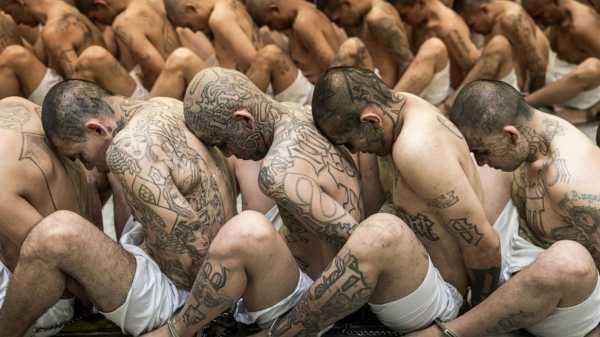
SAN SALVADOR, El Salvador — El Salvador’s government sent 2,000 more suspects to a huge new prison built especially for gang members Wednesday, and the the justice minister vowed that “they will never return” to the streets.
The tough statement came as the administration of President Nayib Bukele asked for yet another extension of an anti-gang emergency measures that would take the crackdown into its 13th month.
Over the last 354 days, about 65,000 people have been arrested in the antigang campaign. Human rights groups say that there have been many instances of prisoner abuses and that innocent people have been swept up in police raids.
The government announced the mass inmate transfer with a slickly produced video posted on social media. It showed prisoners forced to run barefoot and handcuffed down stairways and over bare ground, clad only in regulation white shorts. They were then forced to sit with their legs locked in closely clumped groups in cells.
Gustavo Villatoro, the government’s minister for justice and peace, said the suspected gang members would never return to the streets, even though about 57,000 of those arrested are still awaiting formal charges or a trial.
“They are never going to return to the communities, the neighborhoods, the barrios, the cities of our beloved El Salvador,” Villatoro said.
Only about 3,500 people swept up in the crackdownhave been released so far.
Bukele, who revels in taking a contrarian stance and once described himself as “world’s coolest dicator,” wrote in his Twitter account that “there are now 4,000 gang members in the world’s most criticized prison.”
Dubbed the Terrorism Confinement Center, the prison was inaugurated in February and already holds about 2,000 suspected gang members. It is a sprawling campus 45 miles (72 kilometers) east of San Salvador, the capital, that could eventually house up to 40,000 inmates.
Congress must still approve the extension of the antigang measures, but legislators are expected to do, as they have done a dozen times before.
Bukele requested the special powers to pursue the gangs last March 27, following a surge in gang violence in which 62 people were killed in a single day across the country. Streets gangs like MS-13 and Barrio 18 have long killed and extorted money from residents in El Salvador.
The measures have reduced killings and have proved widely popular among most Salvadorans. Officials say that since the crackdown began, there have been 200 days with no homicides at all.
Under the special powers, the right to association is suspended, police don’t have to tell someone being arrested the reason or inform them of their rights. Someone arrested does not have a right to a lawyer and can be held for 15 days without seeing a judge rather than the previous 72 hours.
The local rights group Cristosal documented 3,344 cases of human rights abuses in the first 11 months of the state of emergency.
Sourse: abcnews.go.com